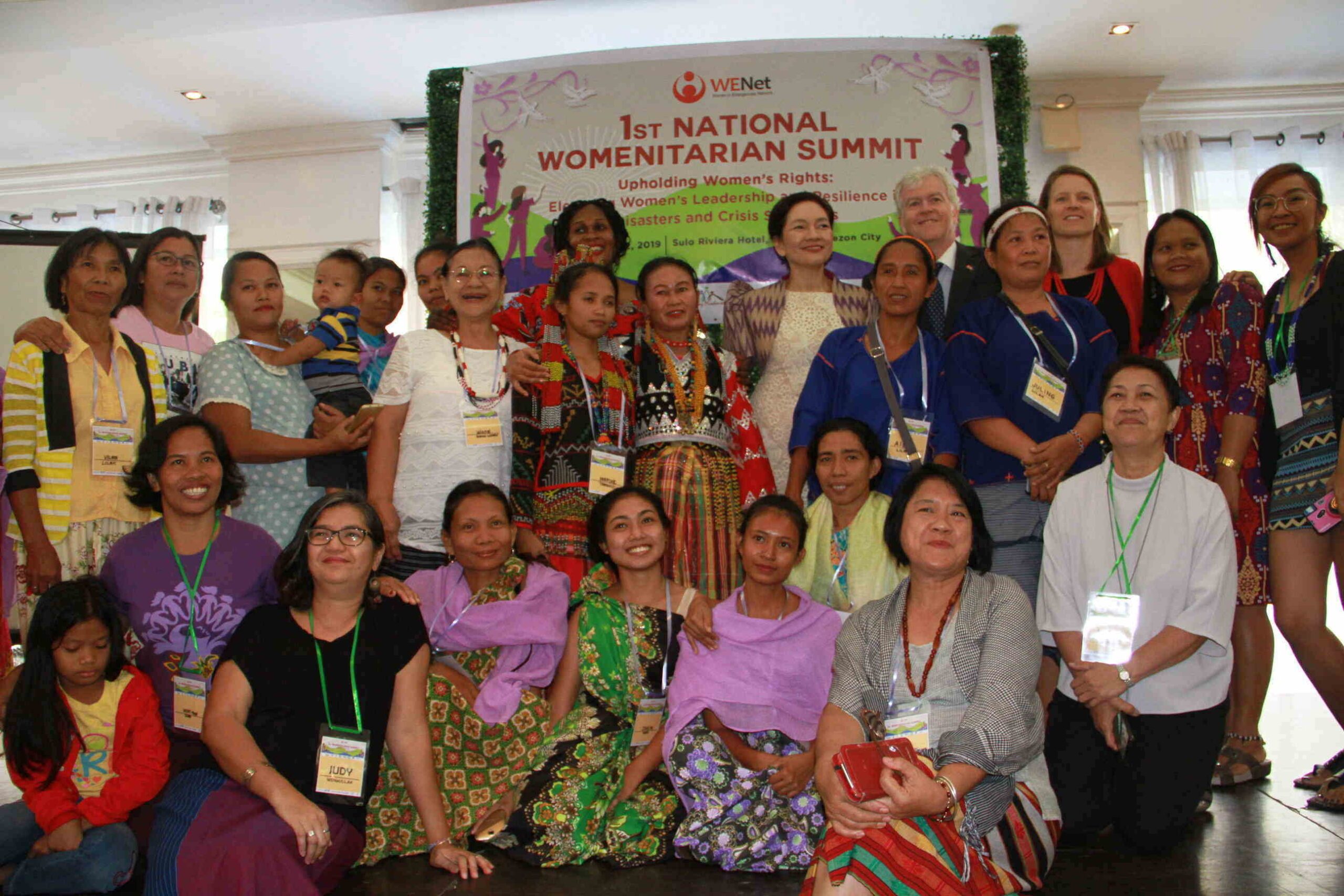SUMMARY
This is AI generated summarization, which may have errors. For context, always refer to the full article.

MANILA, Philippines – Seeing the capacity of women to respond to calamities and crisis situations in their communities, advocates urged government agencies to provide opportunities for women to take leadership roles.
In the 1st National Womenitarian Summit held in Quezon City on Thursday, April 11, leaders under the Women in Emergencies Network (WENet) shared their efforts to empower women to become effective community leaders every time disaster strikes.
WENet is an alliance of civil society organizations that was formed due to Super Typhoon Yolanda (Haiyan), which left thousands of people dead in November 2013.
“When women are supported to lead emergency responses, they ensure everyone in their community is protected,” said Marian Ticzon, project officer of Pambansang Kongreso ng Kababaihan sa Kanayunan.
Impact of climate change
Senator Risa Hontiveros explained that women can help offer solutions to address climate change due to their experiences in the community. (READ: How disasters affect women)
She added how during the 55th session of the United Nations (UN) Commission on the Status of Women, the Philippines initiated a resolution that called for equal gender participation in environmental decision-making. (READ: Why gender matters in natural disasters)
“Napakaimportante po na kasali ang kababaihan sa proseso ng paggawa ng desisyon dahil ang mga karanasan ng kababaihan sa komunidad ay maaring makatulong sa paggawa ng programa at polisiya para maagapan ang climate change,” said Hontiveros.
(It is very important that women are included in the process of decision-making because of their experiences in the community that might help in developing programs and policies to mitigate climate change.)
Women take the lead
Though disasters cannot be stopped, Vice President Leni Robredo raised how everyone can pitch in to minimize their impact.
Robredo pointed out that among the ways to safeguard vulnerable sectors like women and children is to consider their needs.
She also suggested that women be given opportunities to participate in planning for disaster preparedness as well as post-crisis programs that keep in mind their unique needs and struggles.
She brought up how two years after Yolanda hit Tacloban City, female radio broadcasters conducted a workshop for the creation of a disaster response and rehabilitation community radio station in the city. (READ: ‘Radio from Tacloban, for Tacloban’)
“Women can do more when they are empowered,” Robredo added.
Rowena Dacsig, an analyst of the UN Office for the Coordination of Humanitarian Affairs-Philippines, said women can be empowered when their roles as decision makers and leaders are promoted.
“We should also localize our response, build your capacity as the first responders, and be able to build your network and create partnership and alliances,” Dacsig added.
Maria Elna Corazon Jazmines, a coordinator of the Citizens’ Disaster Response Center, also emphasized that along with empowerment, prevention of disaster risks is just as important.
“Hindi tayo magkakaroon ng magandang emergency response kung hindi tayo nagkakaroon ng preparedness. Hindi natin mapapaliit ang risk for disaster kung wala tayong prevention and mitigation,” said Jazmines.
(We will not be able to have good emergency response if we will not have preparedness. We cannot reduce disaster risks if we do not practice prevention and mitigation.)
Face of resilience
Aside from natural disasters, a number of women in the Philippines also find themselves at risk because of internal displacement due to armed conflict and cases of sexual violence and harassment.
During these situations, women tend to keep their struggles to themselves, making it hard to find solutions.
“The more challenging moment…is that when you ask women, ‘Are you okay?’, they will say they’re fine. Are there any reported cases of violence? None…. They [want] to put a face of resilience,” said Carol Angir, program manager of ActionAid Australia.
Hontiveros stressed the vital role of women-led support groups in helping victims of trauma and sexual harassment within their communities.
“Mas tumatatag ang community kapag kasali ang kababaihan sa paggawa ng plano at desisyon, dahil magaling [ang] mga babae bilang educator…. Magaling tayong maghanda ng tao at ng resources sa mga ganitong panahon [ng sakuna],” she said.
(The community becomes stronger if women are included in planning and the decision-making process, because women are good at being educators…. We are good at preparing people and resources in times of disaster.) – Rappler.com
Isabel Lupac is a Rappler intern, and a 4th year AB Communications student from De La Salle Lipa.
Add a comment
How does this make you feel?
There are no comments yet. Add your comment to start the conversation.